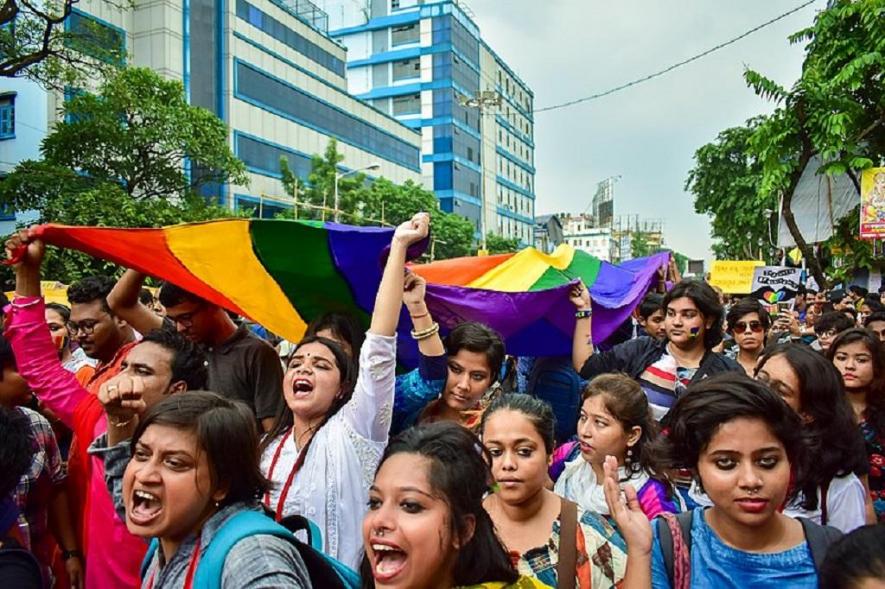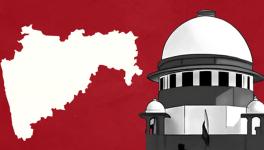Let’s Have Some Power With Our Pride

Image Courtesy: Down To Earth
American Vice President Kamala Harris joined the Pride March in Washington this month, making heads turn, but does it mean relief for the LGBTQIA+ community from the pincer attack of hostile states? Perhaps not. The governor of Florida has banned trans-athletes from participating in women’s sports competitions, making it the 7th US state to ban trans-athletes. Not just the United States. Tensions in Bulgaria lead to assaults and anti-pride protest marches. Hungary joined the bandwagon by passing anti-LGBTQIA+ laws to polarise right-wing voters before a 2022 vote.
So, despite celebrating Pride month, all is not well for the LGBTQ communities around the world, India included. Families refuse to accept a gay son or daughter, and if they do, derision and wider social rejection lie in store. Rape, extortion, murder and a loveless life are on the cards. Recently, the Uttar Pradesh police arrested four men for gang-raping a man. They had met the victim via a dating app. There are countless tales, reported and unreported, of brutality, crime and inhumanity suffered in silence by the LGBTQIA+ community.
Indian machismo deigns conversations about male sexual violence and abuse as taboo. Hence, India lags as a culture on reporting male sexual violence. The transgendered person is socially deprived and economically looted of the right to life and dignity. In short, India is no country for gays.
One simple reason is that the LGBTQIA+ community has no political representation. Far from gay politicians or gays in the military, the Indian society has not even digested gay professors or medical and corporate professionals. The corridors of power are closed for them all around.
The Tamil Nadu government did create the Transgender Welfare board in 2008 and recognised the third gender, which cleared the way to receive government welfare benefits, but the larger gay community was left out. So, when it is already challenging enough to grow up gay, government antipathy makes it worse. The Transgender Protection Act (TPA) was subverted by the Modi government to undermine transgender rights, as it reversed the protections granted by the Supreme Court's 2014 NALSA (National Legal Services Authority of India) judgment that upheld the dignity of the transgender community and granted the status of a backward and marginalised third gender that needs special protection.
The Act is filled with regressive provisions such as only people without sex reassignment surgery can be classified as transgender. The act empowers the district magistrate and committees to categorise and screen people, taking away their right to self-identification.
The transgender communities’ traditional roles are being overtaken too, such as the custom of taking “badhai” on weddings, births, etc., without providing for other means of livelihood. This Act has trapped the transgendered community in red tape to control their lives. It seems politicians and bureaucrats cannot free themselves of their prejudices and interests no matter what.
LGBTQIA+ Reservation?
Unless they get access to power, the LGBTQIA+ movement will always be subverted by those who do not understand citizens’ rights, neglect the equality principle, and carry prejudices. The TPA is a fine example of monumental failure brought on by prejudice and bias.
By way of analogy, the Mandal Commission paved the way for the Other Backward Classes to enter the corridors of power. Post-independence, most of the groups that make up the OBCs got busy organising themselves around one elite-caste party or another, hoping to gain political favours. It wasn’t until they got political representation that their social and economic status started to change for the better. In a way, the OBCs have transformed themselves and India over the past three decades of affirmative action. Reservations continue to challenge traditional caste hierarchies and ensured social mobility for millions.
The LGBTQIA+ community needs an affirmative action program too. India needs positive reservations, which means that all government departments, from education to civil services, need to increase their intake and allot seats to the LGBTQIA+ community. The government had raised in 2014 the question that gay/bisexual individuals may belong to different castes or religions. How should the government then act? The Mandal model, for instance, is based on a point system that covers socio-economic factors, and awards reservation to caste groups for a region only. For example, members of caste X may be accorded reservation in one state but not in the other. This because one caste group or minority can face extreme discrimination in one region and not in the others.
Collective indignation and discrimination are the antecedents for affirmative action. Sexual minorities have suffered enough in families and among their social groups. Hence they deserve affirmative action on par with other depressed sections. Economic and social checkpoints can determine the contours of such a programme. For this to work effectively, the government needs to give people the right to self-identification and not get embroiled in a quagmire of selection. The United States and Europe already adopt this system. This is how India can diversify its decision-making processes.
The Tamil Nadu government recommended in 2019 that transgender people get reservations under the Most Backward Category (MBC) category. The 2014 NALSA judgement also advocated special protections, but the TPA omitted this demand.
States such as Odisha are already ahead of the curve. The Odisha police force may soon have transgendered officials. Meanwhile, other outfits, such as the Noida Metro Rail Corporation, have launched their first pride station. But a lot more needs to be done before the gay and transgender community and every sexual minority feels safe and gets to live with dignity.
To be sure, even affirmative action only opens a window for justice. India needs to expiate from the attacks on the LGBTQIA+ community by penalising those responsible. Those who live in fear or are denied rights also wish to be part of mainstream processes. Every civilised country grants dignity, rights and protection to citizens regardless of identity. It is about time India does so too, fulfilling its constitutional mandate.
Leaders of the LGBTQIA+ movement also need to demand gender forums in each political party and seek their inclusion in state and district-level committees. This cannot be done without strong allies, and solidarity with the Dalits, women, workers and minority groups need to be forged. The farmers’ uprising is another platform that the LGBTQIA+ leaders need to embrace. They need to get political and be ready to enter electoral politics because without political power their pride will always be challenged.
(The author is the former director of Policy and Outreach, National Seed Association of India. The views are personal.)
Get the latest reports & analysis with people's perspective on Protests, movements & deep analytical videos, discussions of the current affairs in your Telegram app. Subscribe to NewsClick's Telegram channel & get Real-Time updates on stories, as they get published on our website.
























